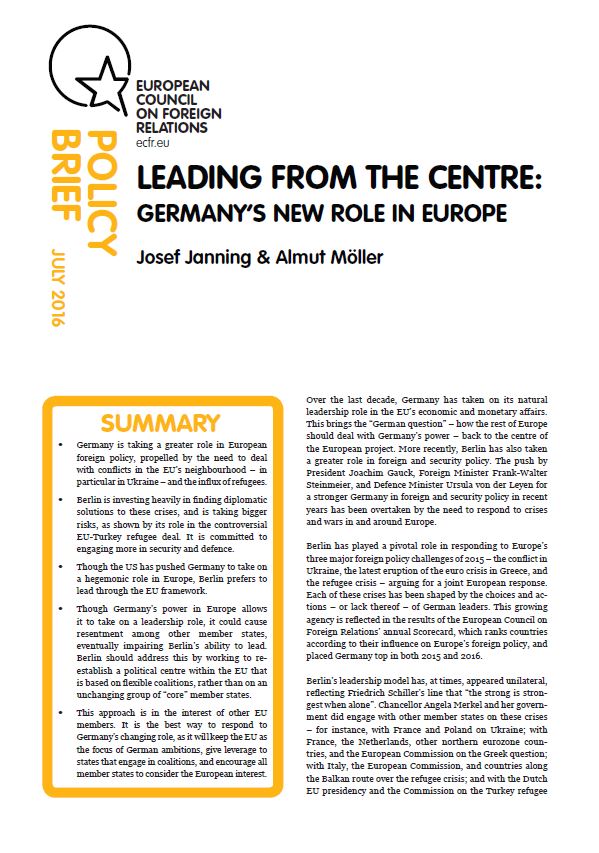Leading from the centre: Germany’s role in Europe
Berlin does not want to dominate Europe, but to exercise leadership via EU institutions – something that will be essential in a post-Brexit world
Germany’s neighbours have nothing to fear from its new-found strength. Berlin does not want to dominate Europe, but to exercise leadership via the EU framework – something that will be essential in a post-Brexit world.
After decades of reluctance, Germany is stepping up to take its place as a leader in European foreign policy. This frustrates some European countries, which fear German hegemony and may act against it. But at the same time, member states place great expectations on Germany to lead the way, an ECFR survey of European policymakers found.
“Leading from the centre: Germany’s role in Europe” argues that both Berlin and its partners have to decide how to deal with German strength, as it isn’t going away any time soon. Seeking to counterbalance Germany’s weight would simply lead to deadlock and stagnation in the EU.
Instead, what is needed are efforts to re-build a political centre of countries willing to jointly push for European solutions. Other EU countries should coordinate more closely with Germany, working to shape and influence its aims. Berlin is committed to leading through consensus, and has rejected Washington’s urging to step up as a benign hegemon for the continent.
Whether or not Berlin wants its new role, the wars at Europe’s gates mean that it is no longer enough to lead on economic and legal questions. Action is needed in the areas of security and defence. And Germany’s leaders can no longer isolate themselves from international relations – the refugee crisis has made foreign affairs a domestic problem that wins and loses elections.
Germany must be careful not to act alone. Other member states’ failure to support Germany during the refugee crisis was due to their resentment of German dominance during the euro crisis. At no time since the fall of the Berlin Wall had Germany been as isolated in the EU as it was in spring 2016. Facing domestic anger over her “refugees welcome” policy, and abandoned by her European partners, Angela Merkel put her weight behind an EU deal with Turkey to manage refugee inflows.
But if the Turkey deal fails, for whatever reason, it will be blamed on Merkel. Berlin will have to face the criticism that Germany used European institutions to pursue its national interests, undermining its claim to represent the interests of the EU as a whole.
If Germany is to be a successful leader in the EU, a better process for building coalitions will be vital – one that takes into account the domestic situation in EU countries. Berlin has already developed a more pragmatic understanding of what it means to work together for the greater European good – one that does not always have to lead to deeper integration or institutional change. Berlin should keep investing in its relationship with France, and make a fresh start with smaller, affluent member states such as the Netherlands, Belgium, and the Nordic countries.
Authors Josef Janning and Almut Möller said:
“Over the last decade, Germany has taken on its natural leadership role in the EU’s economic and monetary affairs. This has brought the ‘German question’ – how the rest of Europe should deal with Germany’s power – back to the centre of the European project. More recently, Berlin has also taken a greater role in foreign and security policy, pushed by a series of crises to advocate for a joint European response to the conflict in Ukraine, the latest eruption of the euro crisis in Greece, and the refugee crisis.”
“Merkel has no appetite for unilateral leadership, and nor will her successors. Anything that appears to be hegemony, even if qualified by the adjectives ‘reluctant’ or ‘benevolent’, repels the German political class. More than other large actors, German leaders feel the need to act within a consensus. They want coalition partners who share their preferences, burdens, and responsibilities.”
“Germany has traditionally placed its faith in the ability of institutions to tame German power, both for its own benefit and that of the EU as a whole – Berlin knows that its power arouses suspicion and resentment from its neighbours. Ironically, the country has become one of the forces undermining the EU’s original structures by increasingly using its weight to veto decisions, and at times acting unilaterally. The German government remains committed to the EU as an umbrella under which European countries cooperate to strengthen security and prosperity. But even in Germany this argument has been more difficult to make lately.”
The European Council on Foreign Relations does not take collective positions. ECFR publications only represent the views of their individual authors.



